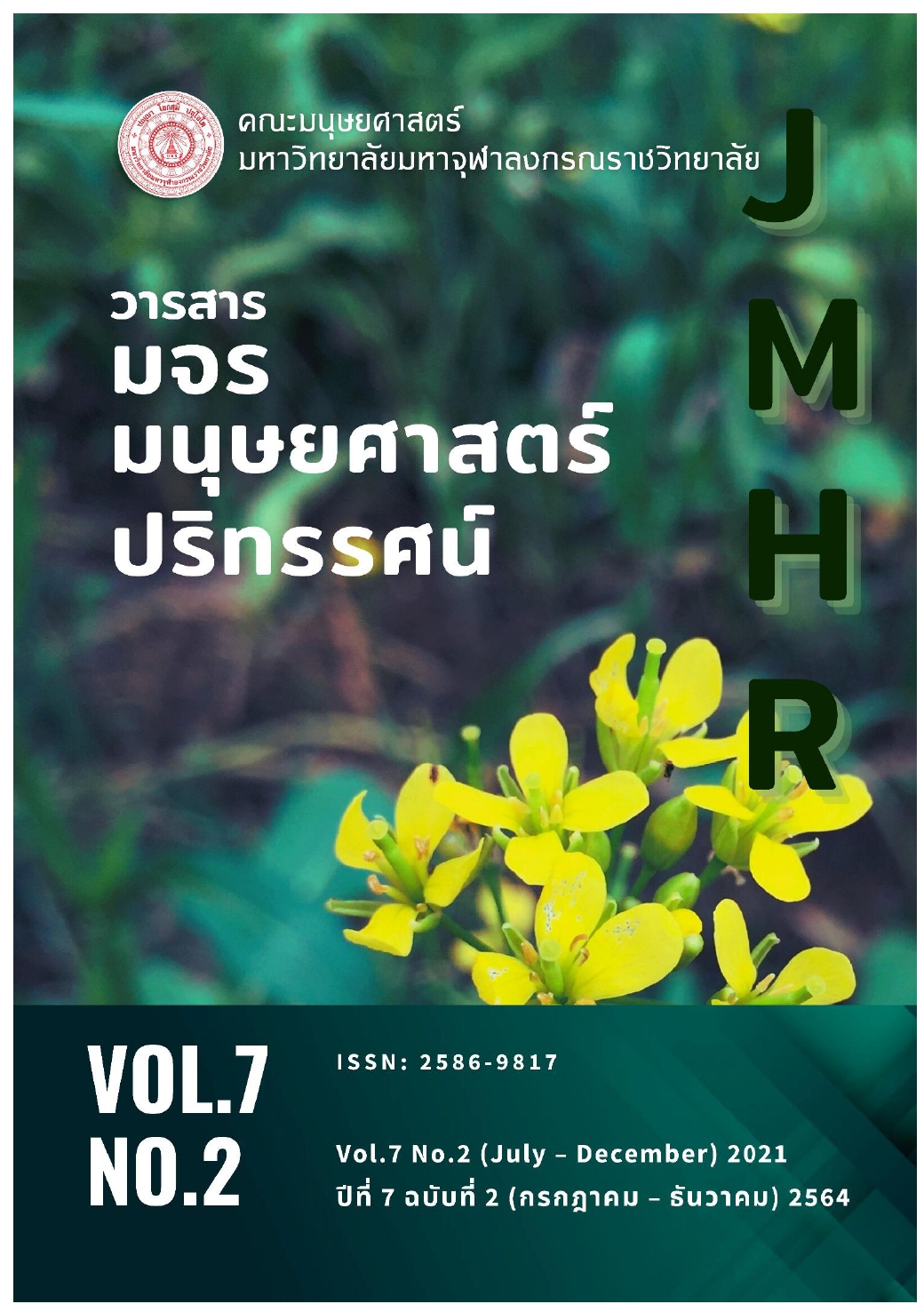ประสบการณ์การเกิดปัญญาของนักจิตวิทยาการปรึกษาแนวพุทธมืออาชีพ ในการทำงาน
คำสำคัญ:
ปัญญา, นักจิตวิทยาการปรึกษาแนวพุทธ, การให้คำปรึกษาบทคัดย่อ
การวิจัยนี้มีวัตถุประสงค์เพื่อ 1. ศึกษาประสบการณ์ของนักจิตวิทยาการปรึกษา
แนวพุทธในการโยนิโสมนสิการความทุกข์ใจจากการทำงานจนเกิดปัญญา 2. ศึกษาปัจจัย
ที่เกี่ยวข้องกับประสบการณ์การเกิดปัญญาของนักจิตวิทยาการปรึกษาแนวพุทธมืออาชีพในการทำงาน โดยใช้ระเบียบวิธีวิจัยเชิงคุณภาพแนวปรากฏการณ์วิทยาแบบตีความในการวิเคราะห์ข้อมูล มีผู้ให้ข้อมูลหลัก 6 ราย ผู้ให้ข้อมูลหลักเป็นผู้ผ่านประสบการณ์ภาคสนามด้านจิตวิทยาการปรึกษาแนวพุทธ ไม่น้อยกว่า 5 ปีหลังจบการศึกษา เก็บข้อมูลด้วยการสัมภาษณ์เชิงลึก ใช้คำถามสัมภาษณ์แบบกึ่งโครงสร้าง ผลการวิเคราะห์ข้อมูลพบว่า ประสบการณ์การเกิดปัญญาของนักจิตวิทยาการปรึกษาแนวพุทธมืออาชีพประกอบไปด้วย 2 ประเด็นหลัก ได้แก่ 1. การสะสมเหตุปัจจัยที่เป็นกุศลเอื้อให้เกิดปัญญาคลี่คลายทุกข์ ได้แก่ เหตุปัจจัยหลัก คือ สติ สมาธิและญาณ และเหตุปัจจัยหลัก คือ สติสัมปชัญญะที่ดึงปัญญามาใช้ 2. การกลับมากลมกลืนกับความเป็นจริงในปัจจุบัน ได้แก่ การกลับมาสู่ปัจจุบันด้วยใจที่เบาสงบและเบิกบาน การมีใจที่สงบขึ้น ปัญญาว่องไวขึ้น ด้วยการเปลี่ยนทุกข์เป็นบทเรียน ข้อค้นพบจากการศึกษานี้สามารถนำมาเป็นฐานในการทำความเข้าใจและพัฒนากระบวนการการพัฒนาจิตใจเพื่อให้เกิดปัญญาตามแนวทางของจิตวิทยาการปรึกษาแนวพุทธได้
เอกสารอ้างอิง
ฉัตรสุมาลย์ ศรีทองอุ่น. (2554). ประสบการณ์ของนักจิตวิทยาการปรึกษาแนวพุทธ: การดำเนินชีวิตและการงานบนฐานอริยสัจ 4 (วิทยานิพนธ์ศิลปศาสตรมหาบัณฑิต สาขาวิชาจิตวิทยาการปรึกษา). จุฬาลงกรณ์มหาวิทยาลัย. กรุงเทพฯ.
ชมพูนุท ศรีจันทร์นิล. (2560). การวิเคราะห์เชิงปรากฏการณ์วิทยาแบบตีความ: ระเบียบวิธีวิจัยเชิงคุณภาพสำหรับการวิจัยทางด้านจิตวิทยา. วารสารศึกษาศาสตร์ มหาวิทยาลัยบูรพา, 28 (3), 1-13.
ณัฐนลิน คำสำเภา. (2555). ประสบการณ์ของนักจิตวิทยาการปรึกษาแนวพุทธมือใหม่ (วิทยานิพนธ์ศิลปศาสตรมหาบัณฑิต สาขาวิชาจิตวิทยาการปรึกษา). จุฬาลงกรณ์มหาวิทยาลัย. กรุงเทพฯ.
ณัฐวร เมฆมัลลิกา. (2563). ประสบการณ์ของผู้ให้การปรึกษาแนวพุทธในการพัฒนาความร่วมมือเชิงบำบัด (วิทยานิพนธ์ศิลปศาสตรมหาบัณฑิต สาขาวิชาจิตวิทยาการปรึกษา). จุฬาลงกรณ์มหาวิทยาลัย. กรุงเทพฯ.
ดลดาว ปูรณานนท์. (2559). บทบาทของสติในนักจิตวิทยาการปรึกษาเชิงจิตวิทยาแนวพุทธ. วารสารศึกษาศาสตร์ มหาวิทยาลัยบูรพา, 28(1), 14-27.
พรมงคล ฉันท์รัตนโยธิน. (2561). สมาธิและพุทธจิต ช่วยบำบัดความเครียด. วารสารพุทธจิตวิทยา, 3(2), 57-64.
พระธรรมปฎก. (ป.อ.ปยุตฺโต). (2561). พุทธธรรม: ฉบับเดิม (พิมพ์ครั้งที่ 36). กรุงเทพฯ: โรงพิมพพระพุทธศาสนาของธรรมสภา.
พระมนตรี ปญฺาทีโป. (2562). การพัฒนาปัญญา: ทำไมต้องมีการพัฒนาปัญญา. วารสารวิชาการ สถาบันพัฒนาพระวิทยากร. 2(1), 1-14.
วรัญญู กองชัยมงคล. (2558). กระบวนการนิเทศแบบกลุ่มตามโมเดลการปรึกษาเชิงจิตวิทยาแนวพุทธ: การวิจัยแบบสร้างทฤษฎีจากข้อมูล (วิทยานิพนธ์ศิลปศาสตรดุษฎีบัณฑิต สาขาวิชาจิตวิทยา). จุฬาลงกรณ์มหาวิทยาลัย. กรุงเทพฯ.
สุภาพร ประดับสมุทร. (2552). การเกิดปัญญาในกระบวนการปรึกษาเชิงจิตวิทยาแนวพุทธ (วิทยานิพนธ์ศิลปศาสตรดุษฎีบัณฑิต สาขาวิชาจิตวิทยา). จุฬาลงกรณ์มหาวิทยาลัย. กรุงเทพฯ.
โสรีช์ โพธิแก้ว. (2557). จากจิตวิทยาสู่พุทธธรรม. นครปฐม: มหาวิทยาลัยมหิดล.






